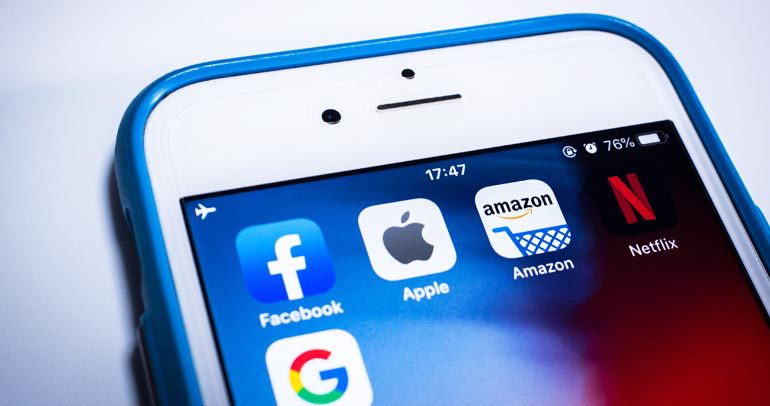
New research from Escalent suggests that while “Break Up Big Tech” is a red hot political topic, consumers aren’t demanding that Facebook, Google, Amazon, Uber, and other tech giants be broken up. At least not yet.
Judging by last week’s Democratic debate, you’d think anyone with a smartphone was standing ready to storm the Google gates and demand an end to monopolistic rule. Nearly fifteen minutes was devoted to the question: “Do Facebook, Amazon, and Google need to be broken up?” The candidates’ responses varied with respect to what “breaking up” means and what the proper level of oversight should be while agreeing, in principle, that a problem exists.
But from a consumer perspective, while consumer trust in Big Tech is shaky at best, a recent study by Escalent suggests that Americans are reluctant to call for breakups.
Does consumer mistrust translate into support for anti-trust action?
To find out, we surveyed 1,000 US consumers and asked questions similar to those posed by the debate moderators.
For each of six big tech companies (Facebook, Google, Amazon, Apple, Uber, Microsoft), we asked consumers for their level of agreement with the following statement: “Because of the way [tech company] limits competition and uses personal information, government should break up [tech company].”
Given Facebook’s current role as the Big Tech whipping boy, it didn’t come as a surprise that Facebook fared the worst. But even so, only 34% either agreed or strongly agreed that Facebook should be broken up, while 37% either disagreed or strongly disagreed with the statement.
In second place was Google with 25% agreeing that government should break it up, followed closely by Amazon at 24%, Uber and Apple at 22%, and Microsoft at 20%.
Clearly, the majority of Americans are not on the “Break Up” train. However, when consumers were asked about their perception of specific practices or behaviors of the tech giants, they were much more likely to express unfavorable opinions. Facebook got the worst of it:
71% are concerned about how Facebook handles personal information
52% agree that Facebook intentionally stifles competition
47% agree Facebook stifles innovation
But it’s not just Facebook. Consumers are definitely concerned about the types of shady corporate practices that anti-trust laws were specifically created to prevent. Here’s what they say about the other tech giants:
Bottom line: Consumers don’t trust Big Tech, and some companies are less trustworthy than others. But this doesn’t mean consumers support breaking up these companies. Given the climate on the blue side of the aisle, one might think Democrats would be more supportive of anti-trust action. However, our research showed no significant difference between those who identify politically as Democrats, Republicans, or Independents.
Are we just too confused or too tired to care?
From a consumer perspective, the problem with the “Break Up Big Tech” movement is that there are too many conflated arguments. It leaves people unclear about exactly what they should be outraged about.
The conflation of outrage was on full display on the Democratic debate stage. It began as a question to Andrew Yang about Elizabeth Warren’s position on Big Tech. Yang pushed back on Warren’s ‘break ’em all up’ plan, essentially saying that technology is a somewhat unique animal and that 20th-century anti-trust frameworks won’t work because encouraging competition is not the obvious answer. “It’s not like any of us wants to use the fourth-best navigation app,” he quipped. But from there, his argument took a weird detour into concerns over children and screen time.
When it was Warren’s turn she went big, railing against “a handful of monopolists dominating our economy and our democracy.” But then she tried to break down in simple terms how Amazon’s ability to collect data on its users is bad for companies that use Amazon as a platform. It makes sense, but it’s a multi-step argument. Does the average American have time for multi-step outrage?
Enter Cory Booker who steered the argument to 2016 election interference. This teed up Beto O’Rourke who said social media companies are being treated like a utility when they should be regulated like publishers and held accountable for misinformation. Kamala Harris pounced, seeing an opening to shut down Trump’s Twitter account.
And it’s not over. Warren jumped back in. This time taking on Big Tech money in politics, saying anyone who accepts those dollars is suspect. Amy Klobuchar invoked the founding fathers’ vision of a start-up nation. Julian Castro stood up for the Amazon worker. And to bookend the whole affair, Yang fired back with ‘it’s your data, you should get paid for it.’ “How many of you remember getting your data check in the mail?”
So which is it? Data privacy? Getting big money out of politics? The scourge of fake news? Bringing back good old-fashioned competition? Screen time limits? Trump’s Twitter account?
For many Americans, it’s simply too exhausting to know how to properly channel their outrage on the issue. And besides:
Google tells us things.
Amazon brings us things.
Apple makes nice things.
Uber takes us places.
Facebook connects us.
Our lives could get really complicated without Big Tech. The public experience of this issue is fast becoming one of malaise versus outrage. We know there’s something wrong with how our data is being handled, but what choice is there? We know we have to filter and question what we see, hear and read. It’s exhausting. But what choice is there?
Break up, no. Regulate, maybe.
One choice, which we offered consumers in our survey, arose as somewhat more palatable than break-up: regulation. While consumers were generally averse to the idea of break-ups, they were more likely to agree that “government should regulate” Big Tech. Appetite for regulation was, on average, more than ten percentage points higher than a willingness to break up any given tech firm. However, even Facebook, the brand that elicits the most sentiment for intervention, musters only 46% who agree with government regulation.
Until politicians offer a concrete and compelling vision for how they will intervene in the tech industry–and how that intervention will improve consumer’s lives–we are likely to remain in this messy state of detente. We don’t trust Big Tech, but we’re not ready to pack up our things and leave.
Find out more about our current research on the trust gap in Big Tech, and ask Escalent about building brand trust.









